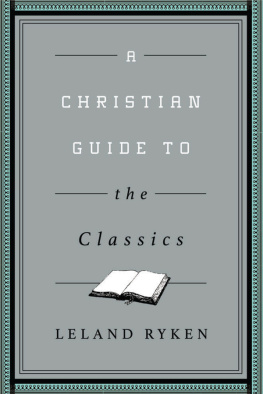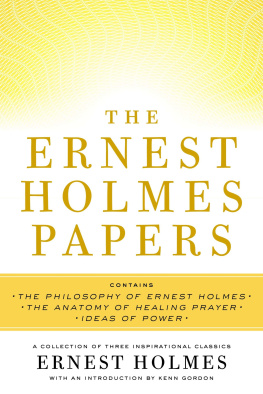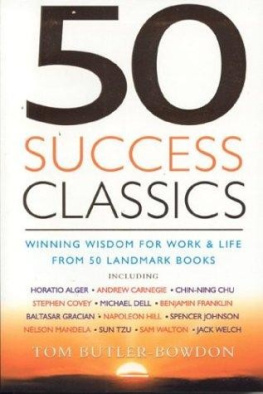Inspirational Classics for Latter-day Saints
Jack M. Lyon
2000 Deseret Book Company.
All rights reserved. No part of this book may be reproduced in any form or by any means without permission in writing from the publisher, Eagle Gate, c/o Deseret Book Company, P. O. Box 30178, Salt Lake City, Utah 84130-0178, or permissions@deseretbook.com. The views expressed herein are the responsibility of the author and do not necessarily represent the position of Eagle Gate.
Eagle Gate is a registered trademark of Deseret Book Company.
Library of Congress Cataloging-in-Publication Data
Inspirational classics for Latter-day Saints / compiled by Jack M. Lyon.p. cm.Includes bibliographical references and index.ISBN 1-57345-778-7 (hardcover)1. Christian life. 2. Christian lifeMormon authors. 3. Spiritual lifeChurch of Jesus Christ of Latter-day Saints. I. Lyon, Jack M.
BX8656 .I58 2000289.332dc2100-027981
Printed in the United States of America72082-6667
10987654321
Except a living man there is nothing more wonderful than a book, a message to us from the dead,... from human souls we never saw, who lived perhaps thousands of miles away. And yet these, in those little sheets of paper, speak to us, terrify us, teach us, comfort us, open their hearts to us as brothers.
Charles Kingsley
Preface
Over the years, certain inspirational books have become classics, motivating young and old to improve their lives, reach their goals, and grow closer to the Lord. Often these books are based on the scriptures, and they have occasionally been quoted by General Authorities of The Church of Jesus Christ of Latter-day Saints to illustrate a point, touch hearts, and change lives. In so doing, the Brethren have often provided helpful commentary on the works themselves, opening them more fully to our understanding and helping us to apply them, along with the scriptures, to our daily walk and talk.
President Gordon B. Hinckley said, I love books. There is something wonderful about a good book.... You can pick it up. You can heft it. You can read it. You can set it down. You can think of what you have read. It does something for you. You can share great minds and great actions and great undertaking in the pages of a book. (The Teachings of Gordon B. Hinckley [Salt Lake City: Deseret Book Co., 1997], 31516.)
President Thomas S. Monson commented, Reading is one of the true pleasures of life. In our age of mass culture, when so much that we encounter is abridged, adapted, adulterated, shredded, and boiled down, and commercialisms loudspeakers are incessantly braying, it is mind-easing and mind-inspiring to sit down privately with a good book. (Pathways to Perfection [Salt Lake City: Deseret Book Co., 1984], 109.)
And President James E. Faust wrote, Members of the Church are encouraged to seek learning from all good books and from any source. For if there is anything virtuous, lovely, or of good report or praiseworthy, we seek after these things. (Article of Faith 13.) (To Reach Even unto You [Salt Lake City: Deseret Book Co., 1980], 37.)
President Heber J. Grant also appreciated good books and often gave them as gifts to family and friends, as explained by his daughter Lucy: [Father] remarked that he had never kept any record of the number of books he had given away but that roughly estimating he could count up to one hundred thousand. (Improvement Era, November 1936, 674.) On many of these books, President Grant wrote these lines by Horace G. Whitney:
What though the price be paltry and small,
What though the cover be old and thin,
What though there be no cover at all,
If worth and merit are written within.
In that spirit, several inspirational classics are presented together in this volume. Though these works were not written by Latter-day Saints and do not always agree precisely with Latter-day Saint belief, they contain valuable insights and admonitions. Even passages that at first may seem questionable offer wisdom to those who read carefully and with the intent to understand rather than condemn.
Although the language of these classics may sometimes sound old-fashioned to our modern ears, their messages are often timeless, as applicable today as when they were first written. They are reprinted here with brief commentaries that, it is hoped, will make them live again in the hearts and lives of Latter-day Saints.
As a Man Thinketh
James Allen
James Allen was born in Leicester, England, on November 28, 1864. In 1879 his father traveled to America, where he hoped to improve his familys financial situation after a business loss. Before he could send for his family, he was robbed and murdered. Fifteen-year-old James had to leave school to work and eventually served as a private secretary for various manufacturing firms. Having a philosophical turn of mind and a natural power of expression, he decided in 1902 to write full time. After finishing his first book, From Poverty to Power, he moved to the small resort town of Ilfracombe, on the southwest coast of England. There he studied, kept his garden, strolled the hills overlooking the sea, and produced his second book, As a Man Thinketh. Dissatisfied with the work, Allen published it in 1904 only upon the insistence of his wife, Lily. During his remaining years, he wrote eighteen other books. He died in 1912.
Despite Allens dissatisfaction with As a Man Thinketh, it has probably been read by more people and quoted by more speakers and writers than any other inspirational classic. The point of the book is that the circumstances of our lives are largely influenced by our own thoughts and attitudes.
Elder Milton R. Hunter, a member of the First Council of the Seventy from 1945 until his death in 1975, explained the books message in this way:
Keep your mind and heart clean and pure at all times. The scriptures truthfully declared: For as... [a man] thinketh in his heart, so is he. (Prov. 23:7.) Our thoughts are like seeds planted in a fertile garden. They take root, grow, and eventually mature in full bloom. Thus the very center of our character-growth is our inner thoughts. Our thoughts precede our actions. They are the underlying forces that shape our destiny....
It is definitely true that each person is the product of his own individual thinking. Mr. James Allen aptly declared: Whatever your present environment may be, you will fall, remain, or rise with your thoughts, your Vision, or your Ideals. You will become as small as your controlling desire, as great as your dominating aspiration....
Thus let me advise:... guard your mind and your thinking continuously. Do not listen to impure or indecent stories.... Remember never to let anything come from your lips that is indecent, suggestive, degrading, or of an immoral nature in any respect. The Savior declared: Blessed are the pure in heart: for they shall see God. (Matt. 5:8.) (Conference Report, April 1963, 15.)
As a Man Thinketh
Foreword
This little volume (the result of meditation and experience) is not intended as an exhaustive treatise on the much-written-upon subject of the power of thought. It is suggestive rather than explanatory, its object being to stimulate men and women to the discovery and perception of the truth that
They themselves are makers of themselves
by virtue of the thoughts which they choose and encourage; that mind is the master-weaver, both of the inner garment of character and the outer garment of circumstance, and that, as they may have hitherto woven in ignorance and pain they may now weave in enlightenment and happiness.












